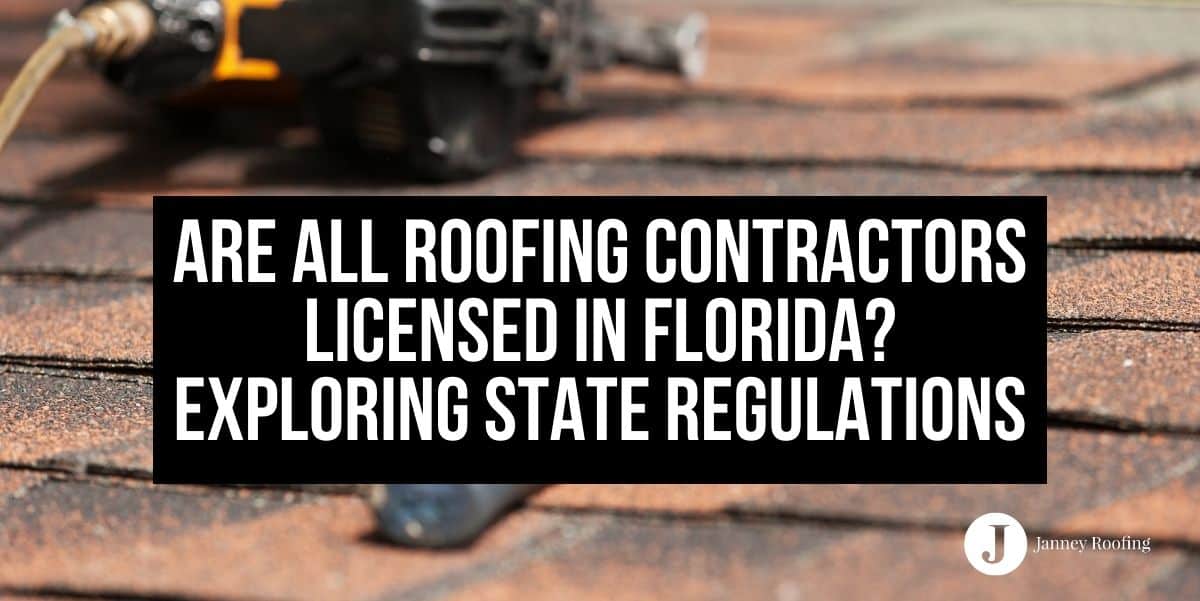If you’re a homeowner in Florida, you know how important it is to have a sturdy and reliable roof over your head. But with so many roofing contractors out there, it can be difficult to know who to trust. One question that many homeowners have is whether all roofing contractors in Florida are licensed.
The short answer is no, not all roofing contractors in Florida are licensed. While the state of Florida requires roofing contractors to be licensed, not all contractors follow the law. This means that there are some unlicensed contractors out there who may not have the necessary skills or experience to do the job right. It’s important to do your research and make sure you’re working with a licensed contractor who is qualified to do the work.
The Licensing Process for Roofing Contractors in Florida
If you are interested in becoming a licensed roofing contractor in Florida, there are several requirements you must meet. The Florida Department of Business and Professional Regulation (DBPR) oversees the licensing process. Here are the three main requirements you must fulfill:
Education and Experience Requirements
To become a licensed roofing contractor in Florida, you must have a combination of education and experience. You must have at least four years of experience in the roofing industry, and you must have completed at least 144 hours of education in roofing-related topics. The education must be completed at a school or training facility approved by the DBPR.
Examination Process
Once you have met the education and experience requirements, you must pass a licensing examination. The examination is administered by a third-party testing company and covers topics such as roofing materials, installation techniques, safety procedures, and business practices. The examination is available in both English and Spanish.
Insurance Requirements
Before you can be licensed as a roofing contractor in Florida, you must provide proof of insurance. You must have general liability insurance with a minimum coverage of $300,000 per occurrence and $600,000 aggregate. You must also have workers’ compensation insurance if you have employees.
In conclusion, becoming a licensed roofing contractor in Florida requires a combination of education, experience, passing an examination, and providing proof of insurance. The licensing process is overseen by the DBPR and is designed to ensure that licensed contractors have the knowledge and skills necessary to provide high-quality roofing services.
Are All Roofing Contractors Licensed?
When it comes to hiring a roofing contractor, one of the most important things to consider is whether they are licensed or not. In Florida, all roofing contractors are required to be licensed by the state. However, not all contractors follow this rule, which can lead to serious problems for homeowners.
If you are looking to hire a roofing contractor in Florida, it is important to make sure that they are licensed. This will ensure that they have the necessary training and experience to do the job right. Here are a few things to keep in mind:
Check the Contractor’s License
The first thing you should do is check the contractor’s license. You can do this by visiting the website of the Florida Department of Business and Professional Regulation (DBPR). The DBPR maintains a database of licensed contractors, which you can search by name or license number.
Types of Roofing Licenses
There are two types of roofing licenses in Florida: Certified Roofing Contractor and Registered Roofing Contractor. A Certified Roofing Contractor is allowed to work anywhere in the state, while an Registered Roofing Contractor is limited to working in a specific geographic area.
Benefits of Hiring a Licensed Contractor
There are many benefits to hiring a licensed roofing contractor in Florida. For one, licensed contractors are required to carry insurance, which means that you will be protected in case something goes wrong during the job. Additionally, licensed contractors are required to follow certain rules and regulations, which means that you can expect a certain level of quality and professionalism.
In conclusion, it is important to make sure that your roofing contractor is licensed in Florida. This will ensure that you are getting a qualified and experienced professional who will do the job right.
Penalties for Unlicensed Contracting in Florida
If you’re caught performing roofing work without a license in Florida, you could face a number of serious penalties. These penalties are in place to protect consumers from unscrupulous contractors who may not have the necessary skills or experience to perform quality work.
Here are some of the penalties you may face if you’re caught performing roofing work without a license in Florida:
- Fines: You could be fined up to $5,000 for each offense of unlicensed contracting.
- Criminal charges: In some cases, unlicensed contracting can be a criminal offense. You could face misdemeanor or felony charges, depending on the severity of the offense.
- Cease and desist orders: The state of Florida can issue a cease and desist order, which prohibits you from performing any further roofing work until you obtain a license.
- Loss of reputation: Performing roofing work without a license can damage your reputation in the industry and make it difficult to find work in the future.
- Legal action: Consumers who have been harmed by unlicensed contractors can take legal action against them, which can result in costly lawsuits and damage to your personal finances.
It’s important to note that these penalties apply not only to the person performing the work, but also to the property owner who hires an unlicensed contractor. As a property owner, it’s your responsibility to ensure that the contractor you hire is properly licensed.
In conclusion, unlicensed contracting in Florida can result in serious penalties, both for the contractor and the property owner. It’s important to always hire a licensed roofing contractor to ensure that the work is done safely and to the highest quality standards.
How to Verify a Contractor’s License
When hiring a roofing contractor in Florida, it’s crucial to verify their license to ensure they are legitimate and qualified to perform the work. Here are the steps to follow to verify a contractor’s license:
- Check the Florida Department of Business and Professional Regulation (DBPR) website. The DBPR is responsible for licensing and regulating contractors in Florida. You can search for a contractor’s license on their website by entering their name or license number. The website will provide information on the contractor’s license status, expiration date, and any disciplinary actions taken against them.
- Look for the contractor’s license number on their website or marketing materials. All licensed contractors in Florida are required to display their license number on their website, business cards, and other marketing materials. You can verify the license number on the DBPR website to ensure it’s valid and belongs to the contractor you’re considering hiring.
- Ask for proof of insurance. In addition to a license, roofing contractors in Florida are required to carry liability insurance and workers’ compensation insurance. Ask the contractor to provide proof of insurance and verify it with the insurance company to ensure it’s current and covers the work being performed.
- Check references and reviews. Ask the contractor for references from past customers and check online reviews to get an idea of their reputation and quality of work. Be cautious of contractors with a lot of negative reviews or no references.
By following these steps, you can verify a roofing contractor’s license and ensure you’re hiring a qualified and reputable professional for your roofing project.
Importance of Hiring a Licensed Contractor
When it comes to hiring a roofing contractor in Florida, it’s important to ensure that they are licensed. Hiring an unlicensed contractor can lead to a variety of issues, including shoddy workmanship, lack of insurance coverage, and potential legal problems.
Licensed contractors are required to meet certain standards and regulations set forth by the state of Florida. They must pass exams, demonstrate knowledge of building codes and safety regulations, and maintain insurance coverage. This means that when you hire a licensed contractor, you can be confident that they have the necessary skills and knowledge to complete the job properly and safely.
In addition to ensuring quality workmanship, hiring a licensed contractor can also protect you from legal liability. If an unlicensed contractor is injured on your property, you could be held liable for their medical expenses and lost wages. Licensed contractors are required to carry liability insurance, which means that if an accident occurs on your property, their insurance will cover the costs.
When it comes to roofing, it’s especially important to hire a licensed contractor. Roofing work can be dangerous and complex, and mistakes can lead to costly repairs or even injury. A licensed contractor will have the necessary training and experience to complete the job safely and efficiently.
Overall, hiring a licensed roofing contractor is essential for ensuring quality workmanship, protecting yourself from legal liability, and ensuring the safety of your property. Don’t take chances with an unlicensed contractor – hire Janney Roofing as your Florida Roofer and be confident that you’re getting the best service possible.
Conclusion
In conclusion, not all roofing contractors in Florida are licensed. While hiring a licensed contractor for your roofing needs is highly recommended, it is important to note that there are unlicensed contractors who may still provide quality work. However, hiring an unlicensed contractor comes with risks such as potentially voiding your insurance coverage and not being able to file a complaint with the state licensing board.
To ensure that you hire a licensed roofing contractor, you can check their license status on the Florida Department of Business and Professional Regulation website. You can also ask for their license and insurance proof before hiring them.
Remember that hiring a licensed contractor not only protects you as a homeowner but also ensures that the contractor is knowledgeable and has met the state’s requirements for licensing. It is always better to be safe than sorry when it comes to your home and finances. If you would like more information or a free quote, use the form below and we’ll be in touch!

